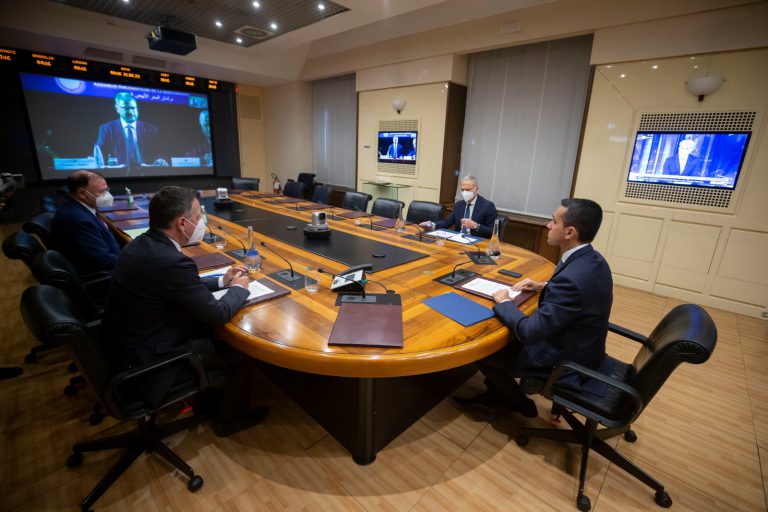What to do about Libya? No military solutions, no division of the country. Gentiloni explains where the Italian negotiations are heading
by Paola Peduzzi
Milan. The negotiations in Libya are moving, some results are being achieved “for the first time”, and “the reawakened glimmer of hope in the talks overseen by the United Nations is multiplying the efforts of those seeking to interrupt or cancel out any political or diplomatic action in the country”. Foreign Minister Paolo Gentiloni explains the UN’s strategy – with a crucial role for Italy, given that “Libya is, essentially, a neighbouring country for us” – to Il Foglio. A strategy designed to lead the country towards a constitution, with first of all “a government of technocrats and ‘wise men’”, says Gentiloni. “That’s the priority for Bernardino León, the UN Special Envoy in Libya, [with whom the Minister is on first-name terms and is in constant contact: “I spoke to him just an hour ago”, he says]. And then, “in 2 or 3 months”, the rebuilding of the country’s institutions.
Talk of a constituent assembly seems bold, after last week’s attack on the Corinthia Hotel, a symbol of a Tripoli that would love to feel like a normal city, and the 3/4 February attack on the al-Mabrook oilfield run by Libya’s National Oil Corporation and the French Total, plus the daily attacks that do not even reach the international media. The minister does not hide his concern: “We need to prevent the attacks from acting as an obstacle to the negotiating process”. We must not stop, in short, because the terrorists certainly won’t (and in our head the words of General Petraeus in Iraq ring clear: “Things will get worse before they get better”. It was true).
According to the American intelligence services – the head of the Defense Intelligence Agency, Vincent Stewart, spoke about this on Monday 2 February to the Armed Services Committee in Congress – the Islamic State presence in Iraq is growing. Its control now extends not just to Derna, which has been a hub for the organisation for some time, but also to Sirte and many areas near Tripoli.
And yet the threat seems, once again, to have been underestimated. Many in Washington, and some Libyan diplomats, are complaining about America’s absence. They are saying that after the deadly attack in Benghazi, Libya has become a taboo subject. Is it true that Obama has turned his back on the situation? “We’re speaking to the Americans all the time”, says Gentiloni, “and they’re very involved. Of course it’s true that they want to see the Mediterranean countries, and Italy in particular, take responsibility, for clear geographical and strategic reasons”.
Europe needs to do more, in short: Italy, with France and Spain, is in charge. “The French are also worried about the terrorist threat in the south, towards Mali, where Paris’s interests are concentrated”. But there are no alternatives to the road map decided in Geneva – to which Italy provided crucial support, “not just political but logistical too, by using our planes to transport the delegations. The North African states have taken on board that military solutions, or the idea of a territorial division of Libya, are not practicable”.
The UN negotiations, therefore. “In Geneva the participants were the Tobruk government that emerged from the elections, the Islamic groups from Misurata and a number of tribal communities: Tripoli didn’t sign up. But news has just come through that the National Congress there might take part, as early as Monday or Tuesday next week, in a new round of talks to create a representative technical government”. Once the process is under way, continues Gentiloni – “but saying this is taking a bold leap of faith”, he adds with a touch of humour in a phone call where the mood is one of concern – “the Italian government would be ready to propose a UN mission to parliament, to support stabilisation”.
If the peacekeepers arrive, Italy will be in the front line. But before that we need peace, which today, with the best intentions, is nowhere in sight. Not least because an important strategic contradiction still persists: the Islamic State is growing stronger through its power in winning territory, but we, who want to stop this advance, never touch that territory. “The expansion of the Da’esh has stopped and has perhaps even been pushed back”, says Gentiloni, however. “Indeed, their obscene propaganda over the last few days, with the Jordanian pilot burnt to death and the horrors we witnessed previously, don’t coincide at all with a period of expansion for the organisation”. So, is it because they’re losing that the Da’esh want to see us terrified and horrified? No, they’re not losing, but “they’re not advancing – thanks to the Kurds, the Iraqis, the coalition strikes and the commitment of countries like our own”.
It’s early to say, and anyway nobody will talk of “mission accomplished” again for centuries to come, and “the Da’esh may well retreat on the ground, but grow more dangerous in their international reach”. But when we see a turning point in the war, “it will start with humanitarian aid and the people of the United Nations”. And Italy will continue to be a part of that.


